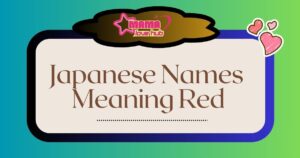Japanese Names Meaning Red
Introduction
In Japanese culture, names hold profound significance, often reflecting aspects of nature, emotions, or aspirations. The color red, symbolizing passion, strength, and vitality, is a prominent theme in Japanese naming traditions. This article delves into the meanings behind Japanese names associated with the color red and explores their cultural and societal relevance.

Significance of Names in Japanese Culture
Names in Japan are not merely labels; they carry a sense of identity, heritage, and familial lineage. Parents often spend considerable time and effort selecting names for their children, seeking meanings that resonate with their hopes and values.
Understanding the Meaning of “Red” in Japanese
In Japanese, the color red is represented by the word “aka” (赤), which goes beyond its literal interpretation to symbolize various concepts such as love, energy, and courage. This vibrant hue holds deep cultural significance, influencing art, language, and traditional ceremonies.
Japanese Names with “Red” Significance
Traditional Japanese Names Meaning Red
Historically, Japanese names meaning red connotations were bestowed to convey auspicious qualities or invoke protective spirits. These names often found inspiration in natural elements like fire, flowers, or celestial bodies.
Modern Japanese Names Meaning Red

In contemporary Japan, the naming landscape has evolved to encompass a blend of traditional and trendy options. While some parents still opt for classical red-themed names, others seek unique or unconventional choices influenced by popular culture or personal preferences.
Cultural Influences on Naming Practices
Japanese naming traditions are heavily influenced by cultural beliefs, religious customs, and historical events. The significance of red in Japanese folklore, for instance, traces back to mythical tales and ancient rituals, shaping the symbolism attached to certain names.
Gender Specificity in Red-Associated Names
In Japanese culture, certain names with red connotations may be more commonly associated with either males or females. This gender specificity reflects societal norms and perceptions regarding attributes traditionally attributed to each gender.
Popular Japanese Names with “Red” Meaning
Male Names
- Akio (明夫) – Meaning “bright man,” this name conveys qualities of strength and vitality associated with the color red.
- Takumi (拓海) – Combining the characters for “expand” and “ocean,” this name symbolizes courage and adventure.
Female Names
- Moroka (桃花) – Translating to “peach blossom,” this name evokes the vibrant hue of red flowers in bloom.
- Aoi (葵) – While commonly associated with the color blue, “Aoi” also signifies “hollyhock,” a flower with red varieties, representing beauty and resilience.
Usage of Red in Japanese Symbolism
In Japanese symbolism, the color red holds multifaceted meanings, ranging from celebration and prosperity to warning and protection. Red motifs adorn traditional garments, festival decorations, and architectural elements, embodying themes of vitality and good fortune.
How to Choose a Name with “Red” Meaning
When selecting a Japanese names meaning red significance, parents may consider factors such as phonetic harmony, cultural resonance, and personal preferences. Consulting with family members or cultural experts can provide insights into the nuances of naming conventions and symbolism.
Considerations for Naming Babies
Naming a baby is a momentous decision that requires careful consideration of cultural, familial, and personal factors. While incorporating meaningful symbolism is important, practical considerations such as ease of pronunciation and spelling should also be taken into account.
Celebrity Influence on Name Trends
Celebrity culture and media influence play a significant role in shaping naming trends worldwide, including in Japan. High-profile figures often inspire parents to choose names associated with fame, success, or cultural relevance.
Social Media and Naming Trends
In the age of social media, naming trends are increasingly influenced by online communities, viral content, and digital aesthetics. Unique or unconventional names gain popularity as parents seek to make their children stand out in a digital landscape saturated with information.
Impact of Globalization on Japanese Naming
Globalization has led to the exchange of cultural ideas and influences, impacting naming practices in Japan. Western names and trends, for example, have gained popularity alongside traditional Japanese names, reflecting the dynamic nature of cultural exchange.

Of course! Here are 70 Japanese names that carry meanings related to the color red, along with their meanings:
- Akani (茜) – Deep red; often associated with brilliant crimson hues.
- Acai (赤江) – Red bay; symbolizing the vibrant red color of the bay.
- Akaka (赤輝) – Bright red; representing vivid shades of red.
- Hamamatsu (赤松) – Red pine; evoking the image of a pine tree with red needles.
- Akamai (赤美) – Beautiful red; signifying the attractiveness of the color red.
- Akanehiko (茜彦) – Red prince; conveys regal qualities associated with the color red.
- Askari (明るい) – Bright, vivid; reflecting the radiant nature of the color red.
- Akashi (赤西) – Red west; referencing the direction west and its association with the color red.
- Akaka (赤岡) – Red hill; suggesting a hill adorned with red foliage or soil.
- Akan (赤尾) – Red tail; possibly inspired by the red tails of certain animals.
- Kasara (赤空) – Red sky; symbolizing a sky illuminated by the red hues of sunrise or sunset.
- Akashi (赤牛) – Red cow; reflecting the reddish-brown color of certain cattle breeds.
- Akaka (赤谷) – Red valley; evoking imagery of a valley painted in shades of red.
- Akaka (赤座) – Red seat; possibly referring to a place adorned with red cushions or coverings.
- Akatsuki (暁) – Dawn, daybreak; symbolizing the red hues of the sky at the onset of daylight.
- Akbar (秋原) – Autumn field; suggesting a field adorned with red foliage during autumn.
- Azuki (秋月) – Autumn moon; evoking the image of a moon tinted with red hues during autumn.
- Akani (赤寺) – Red temple; possibly referencing a temple painted in red colors.
- Ahuja (赤字) – Red character (financial loss); reflecting the negative connotations of the color red in financial contexts.
- Akure (赤狼) – Red wolf; symbolizing the fiery and fierce nature associated with the color red.
- Akashi (明志) – Bright ambition; suggesting ambitious aspirations represented by the color red.
- Akutaq (赤戸) – Red door; possibly referencing a door painted in red for good luck or protection.
- Akamai (赤山) – Red mountain; symbolizing a mountain adorned with red foliage or rock formations.
- Beni (紅) – Crimson, red dye; representing various shades of red, often with a deep hue.
- Benko (紅子) – Crimson child; a name expressing affection for a child with a red-themed name.
- Benmar (紅丸) – Crimson circle; possibly symbolizing completeness or unity represented by the color red.
- Beni Suk (紅助) – Crimson help; suggesting support or assistance associated with the color red.
- Benito Mo (紅友) – Crimson friend; indicating friendship or companionship symbolized by the color red.
- 牡丹) -Botana ( Peony flower (often red); symbolizing prosperity, honor, and beauty.
- Chiara (力) – Strength, power; possibly referencing the vigor and vitality associated with the color red.
- Chinook (千代子) – Thousand generations child; expressing hope for a long-lasting legacy represented by the color red.
- Eda (枝) – Branch (often associated with autumn colors); symbolizing growth and renewal, often depicted with red foliage during autumn.
- Eunji (炎司) – Flame ruler; suggesting authority and leadership symbolized by the fiery color red.
- Enki (炎子) – Flame child; evoking the image of a child with a fiery spirit represented by the color red.
- Enya (炎夜) – Flame night; possibly referencing the red hues of a night illuminated by fire or torches.
- Hijiki (響) – Echo, sound; possibly symbolizing resonance and impact associated with the color red.
- Hiker (光) – Light, radiance; symbolizing the vibrant and luminous nature of the color red.
- Hinata (日向) – Sunny place; suggesting warmth and brightness, often associated with red hues.
- Humira (焔) – Blaze, flame; evoking the image of intense heat and energy represented by the color red.
- Hotaru (蛍) – Firefly (often associated with glowing red); symbolizing illumination and beauty.
- Aroha (いろは) – Colors (red can be represented in this name); symbolizing the diversity and richness of colors, including red.
- Isamu (勇) – Courage, bravery; possibly referencing the boldness and strength associated with the color red.
- Itchy (鼬) – Weasel (often associated with red fur); symbolizing agility and cunningness, often depicted with reddish-brown fur.
- Kurnai (紅) – Crimson, deep red; representing intense passion, love, and vitality.
- Korimako (紅子) – Crimson child; expressing affection for a child with a red-themed name.
- Karena (紅郎) – Crimson son; indicating pride and affection for a son with a red-themed name.
- Medaka (円) – Circle, completeness; possibly symbolizing unity and wholeness represented by the color red.
- Mahima (舞姫) – Dancing princess; suggesting grace and elegance, often associated with the color red.
- Maki (牧) – Pasture, grazing land; symbolizing abundance and fertility, often associated with red foliage during autumn.
- Momiji (紅葉) – Autumn leaves (often red); symbolizing the beauty and transience of life, often depicted with red foliage during autumn.
- Nana (七) – Seven (often associated with the seventh day of the month, which can be represented with red); symbolizing completeness and perfection, often associated with the color red.
- Nanako (菜々子) – Double vegetable child (nana can also mean “vegetables” and be associated with autumn harvests); suggesting abundance and fertility associated with the color red.
- Nao (奈緒) – Apple tree, fresh; possibly symbolizing vitality and freshness represented by the color red.
- Noboru (昇) – Rise, ascend; symbolizing progress and success, often associated with the color red.
- Ren (蓮) – Lotus flower (often associated with deep red varieties); symbolizing purity and enlightenment, often depicted with deep red petals.
- Bell (often associated with red temple bells); symbolizing clarity and purity, often depicted with red adornments or engravings.
- https://youtu.be/Slnr_Cstcv4?si=_4NWcEbMynWXLeEG
- Sakura (桜) – Cherry blossom (often pink or red); symbolizing beauty and renewal, often associated with vibrant pink or red petals.
- Shiba (柴) – Brushwood, firewood (often associated with autumn colors); symbolizing warmth and comfort, often depicted with red hues during autumn.
- Shagamu (繁) – Prosperous, luxuriant; possibly symbolizing abundance and growth, often associated with vibrant red colors.
- Shako (紅子) – Crimson child; expressing affection for a child with a red-themed name.
- Sukuma (雀) – Sparrow (often associated with reddish-brown feathers); symbolizing freedom and agility, often depicted with reddish-brown plumage.
- Tadashi (正) – Correct, righteous; symbolizing integrity and virtue, often associated with the color red in Japanese culture.
- Tatsuya (竜也) – Dragon, peaceful; possibly symbolizing strength and tranquility, often depicted with red scales or accents.
- Tomiko (富子) – Wealthy child; symbolizing prosperity and abundance, often associated with red-colored riches.
- Touma (桃華) – Peach blossom (often associated with red varieties); symbolizing longevity and vitality, often depicted with vibrant red petals.
- Fumiko (梅子) – Plum child (plum blossoms can be red); symbolizing beauty and elegance, often associated with red plum blossoms.
- Yoko (洋子) – Ocean child; symbolizing vastness and depth, often associated with the color red in maritime contexts.
- Your (夜) – Night; symbolizing mystery and intrigue, often depicted with deep red hues during nighttime scenes.
- Yoshi (洋紫) – Ocean purple (can symbolize deep red); symbolizing richness and depth, often associated with dark red or purple shades.
- Yautia (勇大) – Brave, great; symbolizing courage and greatness, often associated with bold red colors.
These names encompass a wide range of meanings and associations with the color red, reflecting its significance in Japanese culture and language.
Conclusion
Japanese names embody a rich tapestry of cultural heritage, symbolism, and personal expression. Japanese names meaning red meanings serve as poignant reminders of the enduring significance of color symbolism in Japanese culture, reflecting themes of vitality, passion, and resilience.
FAQs
- Can I choose a Japanese name for my child if I’m not Japanese?
- Absolutely! Many people around the world choose Japanese names for their children due to their aesthetic appeal and cultural significance.
- Are there any taboos associated with naming in Japan?
- While there are no strict taboos, certain combinations of characters may be avoided due to unfavorable readings or associations.
- 4 Do Japanese names always have specific meanings? Not necessarily. Some names may have straightforward meanings, while others may be more abstract or open to interpretation.
- What if I want a unique name for my child?
- Japanese culture embraces uniqueness and individuality. Feel free to explore less conventional names or create combinations that hold personal significance.

